.png)
Wild About Wildlife Month: Ottawa Valley Wild Bird Care Centre needs a helping wing with HPAI
Wild Wednesday: Ottawa Valley Wild Bird Care Centre shares what you need to know about bird flu and how they are coping
This year my conversation about conservation with the Ottawa Valley Wild Bird Care Centre (OVWBCC) team flew me in a different direction. Wildlife rescue is serious business. It's even more so when navigating a contagious viral infection like H5N1 highly pathogenic avian influenza (HPAI), more commonly referred to as avian flu or 'bird flu.'
It's difficult to provide care to animals with infections diseases. The prognosis can be worse and risks increase for other animals in the facility and in some cases, humans too. Imagine the patient who tested positive and can't talk- only tweet! And I'm not talking about Twitter. That's the challenge the OVWBCC is facing right now.
I connected with Patty McLaughlin, OVWBCC Education Program Manager, and Sandra Sawers, OVWBCC Executive Director to learn more about HPAI and how the centre is coping. They hope to educate about avian flu and help folks make the right decision when they find a wild bird that may be infected. I wanted to know what are the common symptoms of bird flu? Patty shared what HPAI can look like in a wild bird.
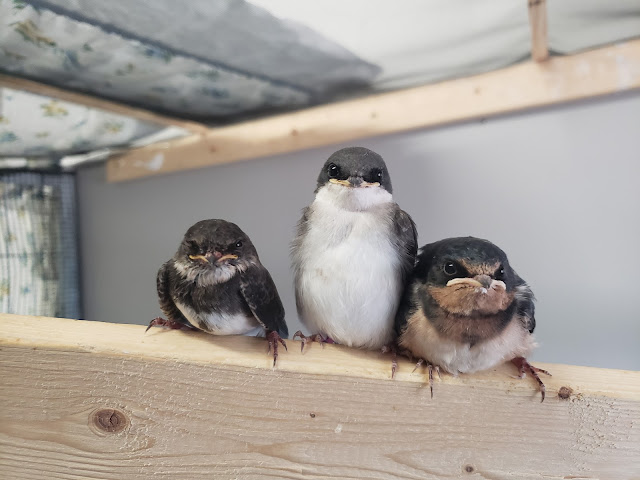 |
Bank Tree Barn Swallows. Photos provided by OVWBCC |
"Avian influenza can present with many different symptoms. We advise anyone who is rescuing a bird to take proactive measures to protect themselves- wearing gloves, a mask, using a towel to cover the bird and washing hands afterwards," Patty said. "The most definitive symptoms of avian influenza are neurological signs such as head tilting, lack of balance, discharge from the eyes, nares or mouth or obvious respiratory distress."
On March 27th, 2022, the first case of HPAI was confirmed in a poultry flock in Ontario, according to the Canadian Food Inspection Agency (CFIA), which is leading the investigation. To further protect Canada's birds, on July 22nd, a restriction on imports of live birds, bird products and by-products from states in the USA affected by HPAI was implemented by CFIA.
Livestock flocks and outdoor pet birds are the focus of public education and government restrictions. But bird flu doesn't discriminate between an 'owned' bird and a wild bird. Wild birds play a pivotal role in our ecosystem and protect biodiversity. These are the birds OVWBCC works tirelessly to protect.
"The centre has been very proactive since the first confirmed cases of HPAI in Canada. We began discussions as a team, as well as with experts across the fields of veterinary and wildlife medicine," said Sandra. "We implemented strict biosecurity standards which included PPE, cleaning protocols, and screening procedures for all new bird admissions. We invested in new equipment and housing enclosures to offer additional space and species separation to reduce the risk of potential transmission between the birds in our care."
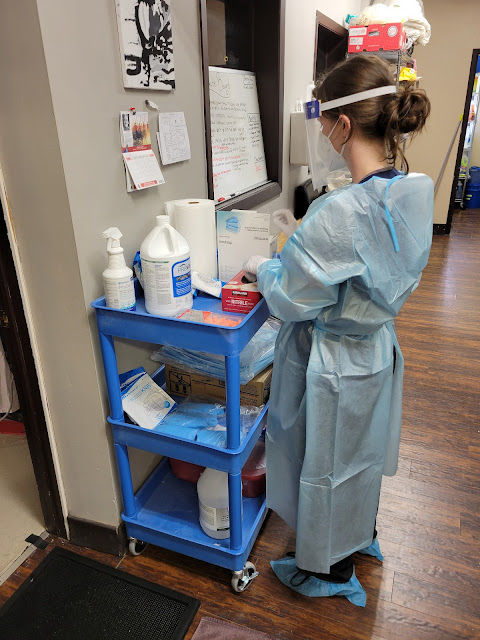 |
Maia O'Sullivan, OVWBCC Avian Care Manager, taking extra percautions |
HPAI also impacts wildlife centres that don't deal specifically with birds. During my correspondence with the Rideau Valley Wildlife Sanctuary team they shared that "related to avian flu, we received another spring-born fox this year who had severe neurological symptoms similar to avian flu as it has crossed over to some mammal species. Because of that, the Canadian Cooperative Wildlife Health Unit in Guelph necropsied the fox and confirmed that it had avian flu." HPAI impacts wildlife in our community on a larger scale than most are aware of. It's been tough on OVWBCC but the team is doing everything possible to carry on.
"When the virus was confirmed in Ottawa we had to make the very difficult decision to pause the intake of water bird species, including ducks and geese, as they are the most likely carriers of the virus, and can present as asymptomatic," Patty said. "This measure was necessary for us to safely care for and protect the birds in our facility during this difficult time. We used this opportunity to increase our educational efforts and spent more time working directly with rescuers to help mitigate potential negative bird-human interactions and find solutions to reunite young waterbirds with their parents. This has been very rewarding for our staff and rescuers alike, working together to ensure wild birds are safe and back with their families, ultimately increasing their chances for survival!"
Although HPAI made their job more challenging, the team finds this work particularly rewarding because they have to think outside the birdcage and create solutions. When a contagious infection is present in the popullation, the importance of their work is amplified. We are fortunate to have such a compassionate team who are dedicated to wild birds. I'm in awe of their empathy and incredible contribution to nature. The team goes to great lengths to rehabilitate birds and you'll be surprised- and amused- by some of their strategies.
"HPAI has also limited our ability to transfer birds to other partner rehabilitation centres that specialize in particular species. Despite this challenge our staff were able to innovate and try new techniques and protocols that are leading to some amazing successes! We have worked with several rescuers and volunteer arborists to successfully re-nest two different Barred Owls and a family of Screech Owls," said Patty.
"For the young owls that could not be renested, the staff has gone to great lengths to ensure they are healthy, strong and not familiar with humans. This has included setting up silent rooms, bringing in a forest's worth of material to design their enclosure space, using taxidermy adult owls for comfort, and yes- even costumes so these owls would not see a human face! The increase in time, effort and resources to set up these specialized spaces is rewarding every time we catch a glimpse of these beautiful healthy owls!"
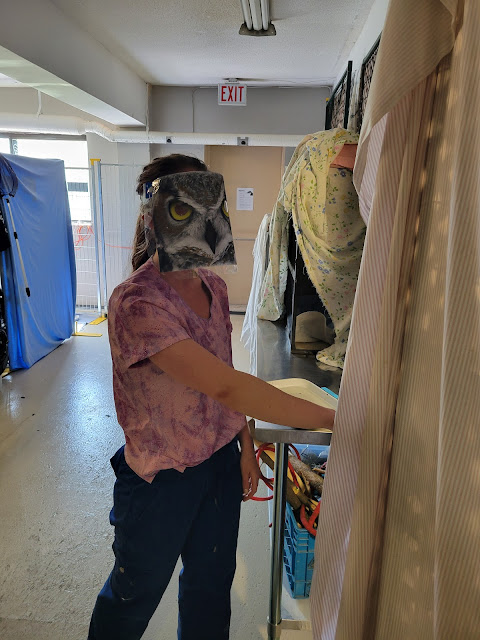 |
Maia O'Sullivan, OVWBCC Avian Care Manager, entering the owl flight cage for feeding time |
Talk about flying above and beyond the call of duty! Protection is important, but prevention can help slow the spread of HPAI. I wanted to know what bird species are more prone to bird flu infection?
"The most likely species of wild birds to become infected with Avian Influenza are water birds, such as ducks and geese, and those that may feed on these birds, like eagles, ravens, and vultures. Waterfowl species are the natural carriers of avian influenza in the wild, and are present in the population to some extent every year," said Patty. "This year is very different because of the presence of this highly pathogenic strain of avian influenza that spreads easily and is, unfortunately, more fatal."
With any viral outbreak, like HPAI, comes the fear we may lose species at risk. Every species helps maintains balance in our fragile eco-system. Losing even one species at risk could be detrimental.
"Unfortunately the HPAI outbreak is not over and the full extent of its impact on the bird population is not yet known. The outbreak coinciding with nesting season has likely resulted in failed nests and missed nesting opportunities for some birds as well," Patty said. "We are especially concerned about birds who naturally do not have high population numbers, such as raptors, and those whose populations are in decline. Losing one adult Bald Eagle to HPAI during nesting season can have devastating consequences to its young and future generations. Which is why we truly believe that each bird we are able to save and give a second chance at life matters!"
I couldn't agree more. That is why OVWBCC needs our continued support. Thankfully, the community is putting their best beak forward.
 |
Great Horned Owls |
"An outpouring of support from the public and our partner organizations has allowed us to continue to operate and adjust to the challenges of HPAI as the situation continues to evolve. Looking ahead, we anticipate being on high alert during the fall migration season and will continue to do everything we can to safely help as many wild birds as possible," said Sandra. "Monetary donations of any amount are the most valuable gift the public can make at this time. These life-saving funds allow us the flexibility to purchase essential supplies and equipment as needed to respond to this ever-changing and evolving situation."
There are actions you can take to prevent wild birds from becoming infected with bird flu.
"The public is being asked not to feed any type of bird by hand and to remove wild bird feeders if they own domestic poultry or have water birds visiting their feeding area," said Patty. "The risk of transmission increases when birds gather closely together. Songbird and hummingbird feeders are the least risky at this time. Frequent washing with nine parts water and one part bleach solution is recommended. Please help monitor the situation by reporting sick or deceased waterbirds to the Canadian Wildlife Health Cooperative."
OVWBCC is following strict protocols for bird intakes to help lower HPAI spread. Each measure is an important piece of the puzzle- or strand of straw in the bird's nest- when it comes to community health and safety. The team's empathy soars above the clouds, so it can be stressful to limit their services.
"As a centre that has never turned away a wild bird in need in over 40 years, it has been difficult for our team, volunteers and supporters alike, to adapt to the new restrictions," Sandra said. "HPAI has been scary and stressful to manage but the outpouring of support and understanding from our birding community has been amazing! We have seen how much people care about wild birds and how willing they are to help us cope during this difficult time."
The incredible work done by OVWBCC is supported by the community, including volunteerism and kind donations. Any donation is helpful, especially at a time like this, whether it's small like a Hummingbird or as big as a Blue Heron. I humbly ask you to please donate to the Ottawa Valley Wild Bird Care Centre.
"While it has been challenging, it has also been a great learning experience for our team. We have new knowledge about zoonotic and viral infections, and new protocols to continue improving the level of care required to maintain our high standards for wild bird rehabilitation success. We have implemented many new techniques, invested in new equipment and will be able to use and apply what we have learned moving forward at our new centre," said Sandra.
"Our future advanced care facility will be well equipped with designated isolation areas to accommodate all species and provide the best care for birds in situations like another HPAI outbreak. We are continuously improving our standards of care, providing staff training and collaborating with other skilled professionals in our field. This proactive learning approach gives the staff confidence, pride, and a sense of accomplishment to continue the important life-saving work that we do!"
In my 2021 OVWBCC Wild Wednesday story, I shared a photo of the new centre's building design. I was eager for an update about the fundraising campaign. It was an update worth flapping your wings about.
"The Centre’s building campaign for our new advance care facility recently reached a huge milestone surpassing its original fundraising goal of $1.7 million!" Sandra shared. "It is amazing to see the Ottawa Valley community come together to help ensure this essential facility will soon be built. Like many build projects affected by the pandemic, we have encountered a number of setbacks and delays. We are currently in the final stages of the site plan approval process with the City of Ottawa. With the funds raised so far, we will be ready to begin construction as soon as the permits are approved. Until then, we will continue to fundraise, plan, and purchase the essential life-saving equipment that will furnish our new avian hospital."
"The centre continues to provide treatment to as many birds as we can on a case by case basis. We have admitted over 2000 birds of 88 different species so far this year!"
1255 of the birds admitted this year are baby birds. It's officially baby bird summer!
 |
Cliff Swallow |
"We are midway through the summer but expect 100’s more babies to arrive before it's over," said Sandra. "One particularly interesting and rare occurrence was caring for four different swallow species, all at the same time! We had a Tree Swallow and a Cliff Swallow, as well as two threatened species, a Bank Swallow, and Barn Swallow, in treatment at the same time. Although they were all swallows, each species had a slightly different personality. The Tree Swallow was the most energetic, often found perched on the back of the very calm Barn Swallow awaiting a feeding. The Cliff and Bank Swallows were a bit more secretive and enjoyed their own space away from the others. The best part of the story is that all four were successfully released back to the wild last week!"
Success stories make the HPAI outbreak a bit more bearable. The public can support OVWBCC by learning as much as they can about bird flu and knowing the answer to the most important question: What should I do if you find a wild bird I think has avian flu?
"If you find any bird, especially water birds (ducks and geese), corvids (crows and ravens), or raptors (hawks and eagles), displaying neurological presenting symptoms, or come across an area with a number of deceased birds, please contact the Canadian Wildlife Health Cooperative (1-866-673-4781). If you are unsure please call the Ottawa Valley Wild Bird Care Centre at (613-854-2849) and our staff will be happy to discuss the situation to suggest the next steps."
 |
Baby Great Horned Owls |
Information about how to protect owned birds, pet birds, and livestock flocks can be found on the CFIA website. An Avian Influenza Surveillance and Diagnostics line has been created to report a sick bird: 1-226-217-8022 available 8:00 AM- 6:00 PM (EST). You can also email cfia.ontsurveillanceanddiagnostics-survetdiagnostiques.acia@inspection.gc.ca
Thank you to the Ottawa Valley Wild Bird Care Centre team for your incredible work and for sharing valuable information about avian flu. I know how busy you are and I'm so appreciative you took the time to connect with me.
Please CLICK HERE and make a donation
to the Ottawa Valley Wild Bird Care Centre.
Never miss a chirp by following OVWBCC on Facebook, Twitter, and Instagram, and check out their YouTube channel to get an inside look at the Centre. Subscribe to the OVWBCC newsletter for updates!
Check out other Wild Wednesday posts!
Give me a high paw and follow Paws For Reaction on Pinterest
Like Paws for Reaction on Facebook
Follow @PawsForReaction on Twitter
Follow @PawsForReaction on Instagram
Follow my blog and subscribe in the sidebar >>
#WildWednesday
.png)
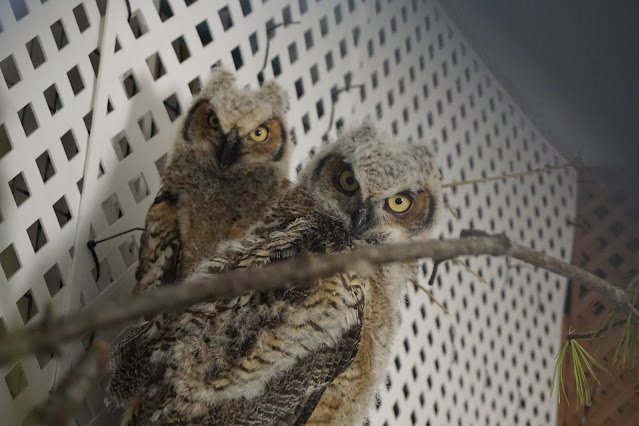
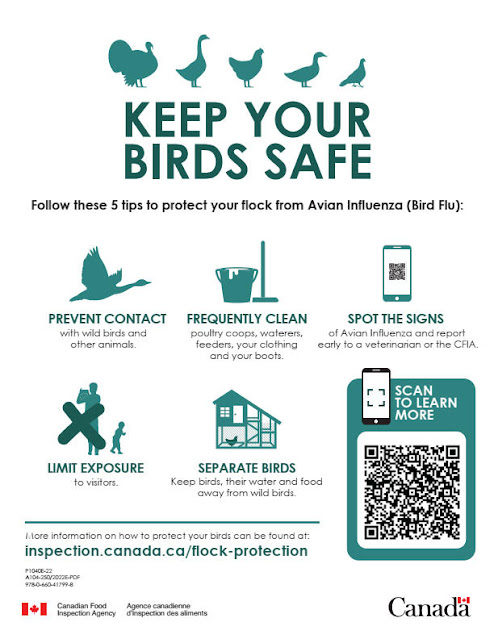

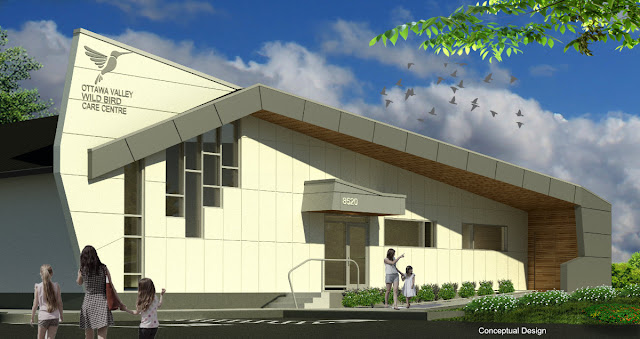
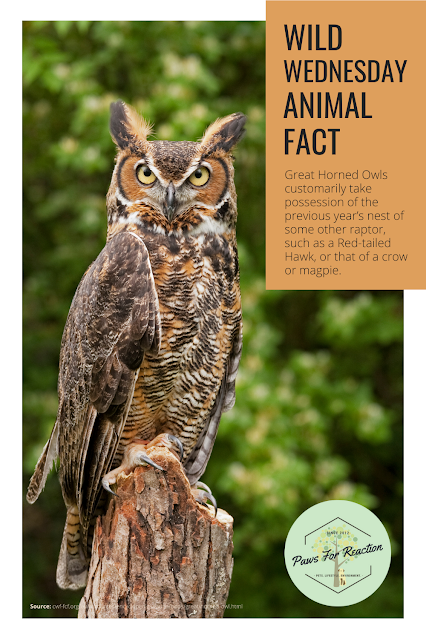
.png)
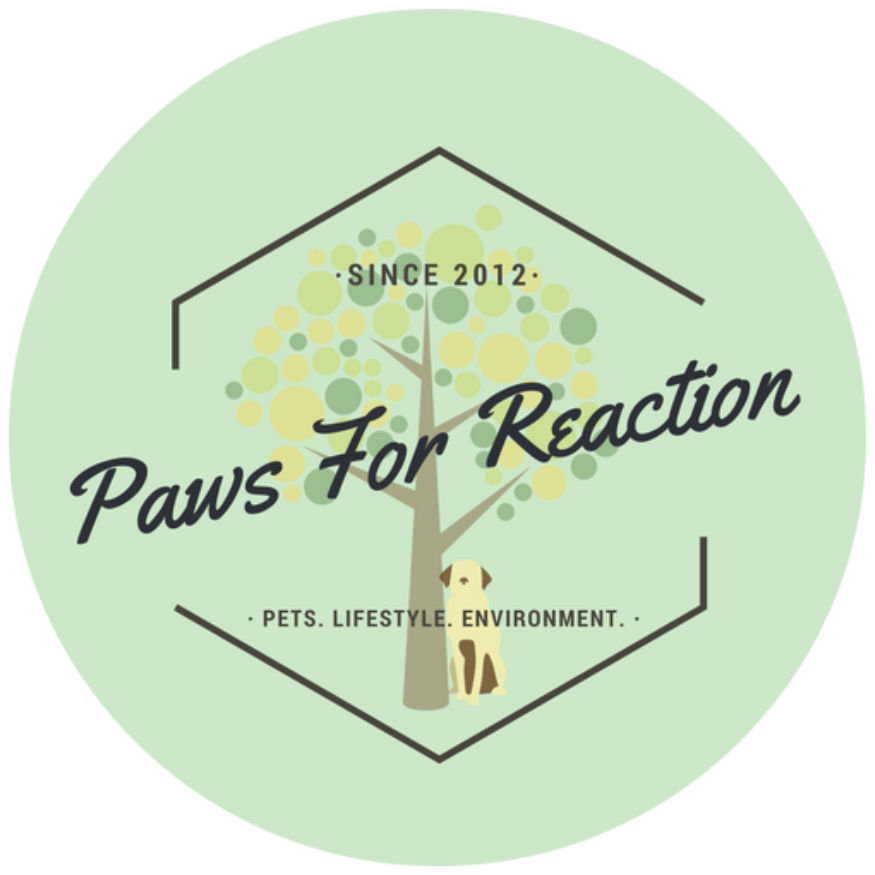

















0 Comentarios